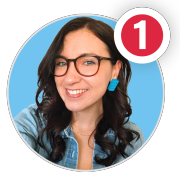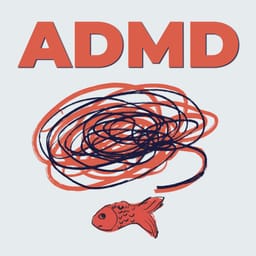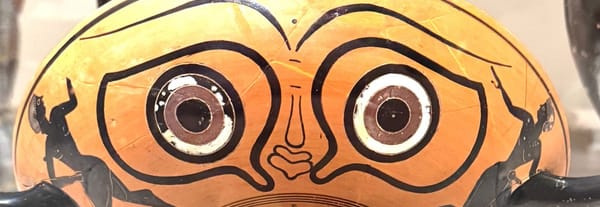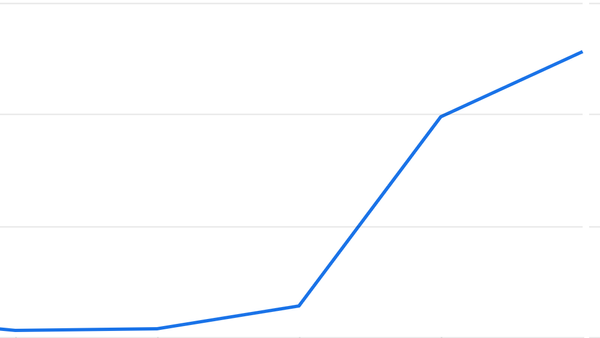Guest Post #3: How vulnerable marketing builds trust
Can I let you in on something? I feel like I’m behind. I feel like I tripped going up the side of Mount Everest and I’ve hit every branch on the way down to the bottom.

Meg is an experienced multimedia designer and brand marketing leader on a mission to create meaningful connections and make people feel seen. Most recently leading Creative Strategy at OpenView Ventures she uses her skills in graphic design, brand development and audio/video production to curate experiences that drive resonance, relationships, and results. (She's also just joined our team at Kalyna Marketing as a consultant!)
When she’s not working you can find her making delightful design videos for YouTube, leaving you a heart-felt voicemail on her Substack newsletter, or taking photos of her cat Noodle.
As a bonus, I (Mariya) am also featured on Meg's most recent newsletter essay - "Memory Redirects". Check it out!
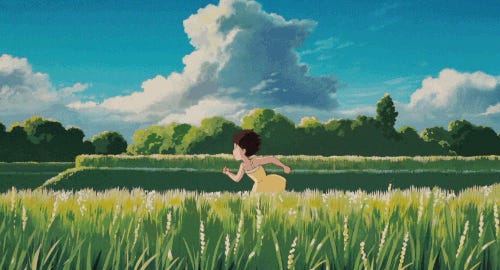
If You Want to Write for ADMD:
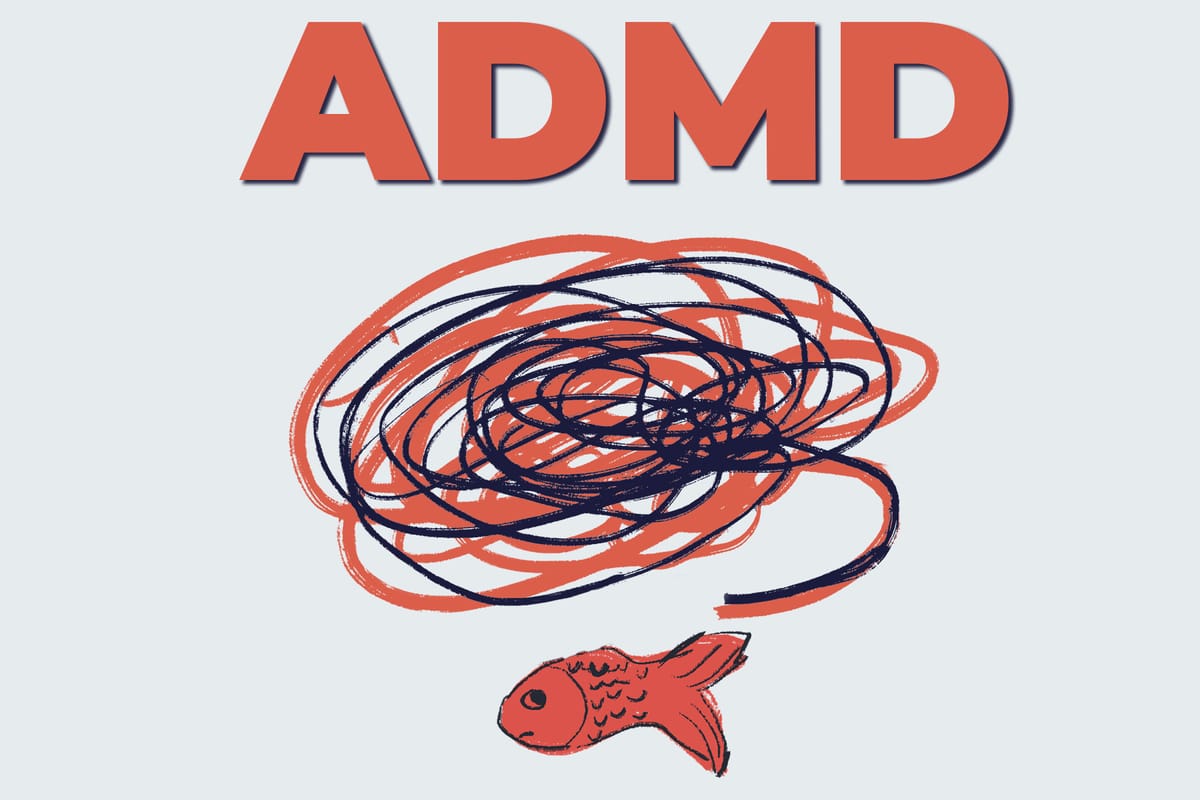
Can I let you in on something?
I feel like I’m behind.
I feel like I tripped going up the side of Mount Everest and I’ve hit every branch on the way down to the bottom.
Each WHACK of a branch in my gut or scrape on my knee reminding me I don’t look like the person I was when I started this hike.
But really, I had to take unexpected time off and now I worry if I’m relevant or even capable anymore. Not that I was super relevant in the first place, but it seems like technology and marketing move so fast you could sneeze and suddenly need a tutorial on how to use your own toilet.
So why am I embarrassing myself on the internet by telling you this? Because marketing is inherently about building trust. But what is trust without vulnerability?
Emotions are universal
You may not have dislocated and broken every bone in your ankle, but you can probably relate to the feeling of falling behind or not feeling good enough to keep up.
When I was a kid, we were forced to run a timed mile in gym class. I dreaded it every year of middle school.
I was slightly overweight and considerably terrible at running.
Every time I’d run for as long as I could while everyone would pass me and I’d be left in their dust. Grades 6th and 7th I’d just walk the rest of the way because I knew there was no way I was catching up to my classmates. Each time I had to run the mile, and fail, I’d come home and cry, feeling emotionally (and physically) behind everyone in my class.
By grade eight I was slightly less overweight thanks to puberty and considerably more determined thanks to being motivated by spite. After two years of failure I decided that I refused to let one sweaty day out of the year depict my social and physical sense of self-worth. I refused to fall at the expectation of my own failure. So after years of feeling not enough I was going to prove to myself (and my P.E. teacher) that I was indeed enough. So that year, the last year, I decided I was going to make the mile my bitch. And it wasn’t until I met someone understanding, kind, and helpful did I see that I had my own success waiting inside me all along.
The first week of 8th grade I opened up to a classmate of mine, Haley, who was the social butterfly of our class. Even if she wasn’t the fastest runner or 1st string player, she played a lot of sports and always seemed to have fun. We were acquaintances, our orbits getting closer just by pure proximity of being in the same classes for 3 years in middle school. She was popular but in an authentic way, there wasn’t this plastic unattainable sheen to her that the other popular girls had which made her seem more approachable.
One day as we’re getting changed for P.E. in the girls locker room, she could probably tell I was in my feelings by the way she asked “Hey, you good?”. I always wear my emotions on my sleeve, so I quickly opened up. I told her how I felt about running the mile and then added “but it’s whatever, I’ll just fail like I always do. It’s no big deal, I’ll still pass P.E.”
Haley looked at me with the softest most understanding smile and said “Join the cross country team with me. I’m bad at running too. But I pinky promise I’ll run slowly with you, and we can get better together, so the mile doesn’t suck as much.”
She didn’t say this but she would also help me make friends. Even if I was awful, at least I had some good company when they’d lap me.
When spring rolled around I had a year of losing cross country races under my belt and I was ready to take on this mile.
The stopwatch started. We took off, running through the trees like always. And I got a little farther than I normally did, but then…
The “wow I wanna puke” feeling set in. I had to stop and walk.
Defeat started to wash over me, sweat pouring from my scalp and tears welling in my eyes, but then I remembered every race I had finished that school year. Even if I was in last place (which I was) I always finished the race with the best jog I could do for the few people that waited at the finish line.
Thinking back to that, I knew what I had to do, so this time instead of feeling too behind to try, I gave myself a minute to catch my breath and then I began running again. Against all beliefs (especially my own) I managed to not only pass the mile run test for the first time, but I managed to get a B+. I was elated, and feeling how I do now (behind) I think I need to channel that energy more often.
But again, why am I telling you this?
Vulnerability builds trust and fosters growth
Whether you’re growing a team, business, or yourself – you need vulnerability for growth. But yet vulnerability is incredibly difficult to achieve, especially in a professional working environment.
When people are vulnerable, you trust them. That trust then leads to influence and action.
Think about your closest or most influential relationships: they all have a shared sense of vulnerability, something that makes you feel safe to be yourself. I would’ve never joined the cross country team, gotten better at running, or passed P.E. if it weren’t for Haley making me feel understood and offering genuine support.
As a marketer, your “brand” is the relationship you have with each person who interacts with it. Understanding the vulnerabilities of your target audience is the purest way to connect with them and influence them to take a preferred action so you can support them with your service, brand, or product.
Be the friend who helped me get out of my self-pity shell and got me to take action.
No, this isn’t about profiting off of people’s emotions. It’s about meeting your customer where they are, showing you understand and that you have pure intent to help. Companies that embrace vulnerability and provide value with clear intentions of making that person’s life better will achieve brand authenticity that not only resonates, but scales sustainably from the inside out.
For example, companies often boast “#1 trusted source for X” but it’s a lot easier to say people trust you than to actually get people to trust you. Instead of focusing on industry awards as validation, incentivise consistent customer or peer reviews. Real reviews (recent ones especially) matter more than regal awards.
Imagine seeing an ad on LinkedIn that’s very vague with their offer saying things like “Grow your business better today, start for free!”. Generic copy like that does provide value (grow your business, for free) but it’s not clear for who or how your tool will help them. It feels like a false pinky promise. Instead, you can say something more specific and meaningful like “The CRM tool that saves time and money for entrepreneurs. Start free!”. Specificity lets the reader know who the ad is for (entrepreneurs) exactly what it is (CRM tool) and how it will help (save you time and money).
Meaningless promises of “It works!” may have been enough in the early days of marketing cleaning products to isolated housewives, where hiding behind a fancy copywriting facade was how you dazzled your way into buyers but that strategy doesn’t work anymore. People are far less trusting nowadays and they don’t want to be dazzled, they want help. They need support, not a false hope.
The Cringe Factor
You may be wondering “But Meg, you glossed over how incredibly cringeworthy it must’ve been to join the cross country team and be the last person at every race.”
And you’re right! It was incredibly cringe-y. All of my friends on the team were super in shape, winning their races or falling to the middle of the pack, but I didn’t mind being a loser. I was a loser with a winners mentality. I was winning the long game (in my mind at least) and honestly I need to rekindle that audacity again.
Vulnerability is cringe and our internet culture makes us terrified of seeming cringe.
Remember when we could just be lame in our basements making dumb videos with our friends in iOS Photobooth that would (thankfully) never see the light of day? That’s not the reality kids face today. Apps like TikTok and Instagram make the world seem so much bigger than ours was before social media. It can feel like all eyes are on you, and if you’re not viral you’re nothing.
We all need to remind ourselves how small our worlds actually are, and how good it can be to just be ordinary. It’s okay to be cringe. It’s actually good for your character development to not have 1,000,000 detached opinions thrown at you every day. It’s good to suck at something just for the sake of getting a tiny bit better at it.
I used to be fearless, so cringey, and I think it helped me build the confidence to connect with people which is what I need right now to stop feeling so behind.
Connection through cringe
When we allow ourselves to indulge in being cringe, being playful, feeling unjudged, that’s when the most authentic relationships happen.
Those are the relationships that make moves, that inspire action.
As a designer and marketer I think a lot about how to connect with people, what really moves people to feel something and feel so moved to act upon that feeling. I’ve realized every potential relationship goes through the cycle of: Play > Resonate > Memory > Connection
After a few cycles from play —> connection a sense of belonging can begin to emerge. With time and repetition, that’s how affinity grows. And from affinity comes trust that influences action.
I imagine this process to look something like this
Where does vulnerability fit in marketing?
Vulnerability has been replaced by marketability, not just in marketing but in everyday life.
Thanks to the hyperconnectivity of social media, dating apps, and dating reality TV shows, people are getting used to only offering the most marketable version of themselves instead of what’s most genuine (and usually a little cringe-y).
This can be confusing to us marketers trying to put people in a neatly labeled box to be marketed to. This fake persona is leading to a disconnect between ourselves and others making it harder to build trust and inspire action.
Marketing teams need to let their audiences know they’re safe to be themselves with them, show their audience that they don’t have to put on a facade to protect their ego. Instead prove to them, with clear intentions and value, that you understand how they feel, where they’re at and how to help.
Be that friend that helped me run.
Top 3 Reading Recommendations
- "Memory Redirects" by Meg Johnson + Mariya Delano. - this features yours truly! It's a memory of me, Mariya, and my dad.
- "Connection vs. Belonging" by Meg Johnson. Eyebrows, marketing, connection. What more could you need?
- "Prioritizing Play" by Meg Johnson. We should remember, as adults, that all humans need play.
Musical Minute
“Slow down you crazy child
You're so ambitious for a juvenile
But then if you're so smart tell me
Why are you still so afraid?”
This song makes me feel seen. The ballad has a carpe diem tune to it that speaks to the nature of my ambitious attitude towards life that unfortunately tends to manifest itself as the fear of falling “behind”.
Billy uses “Vienna'' as a metaphor for growing older but not in the expected “seize the day!” way as the upbeat melody suggests. The inspiration for the song came from Billy meeting his estranged father for the first time since his adolescence. As Billy and his father walked the borderline of Vienna they saw an elderly woman sweeping the street. Billy looked to his father and mentioned how sad it was seeing an old woman forced to work a job like that. His father disagreed and told him “No. She feels useful, she has a place in our society.”
This highlighted how culturally different being an elderly person is in Europe versus the United States. Billy explains “In Europe they don’t throw old people away like we tend to do here in the states…You don’t have to squeeze your whole life into your 20s and 30s trying to make it…You have a whole life to live. I kind of used ‘Vienna’ as a metaphor, there is a reason for being old, a purpose”
“Slow down, you're doing fine.
You can’t be everything you want to be before your time.
Although it’s so romantic on the borderline tonight (tonight).”
When I feel like I’m falling behind, incapable of ever catching up, fully ready to throw in the towel, I remember that friend Haley and this song. As I navigate this next race of life, finding my place within it, I need to remind myself that sometimes the best things take time and a little bit of help. Don’t give up before you’ve given yourself the time to try.
“You can get what you want
Or you can just get old”
I don’t know where this next race will lead me or how long it will take to get to the finish line but I know it will be worth the run. So I’ll just keep running.
“When will you realize, Vienna waits for you?”
(Source for the Billy Joel Quotes)


